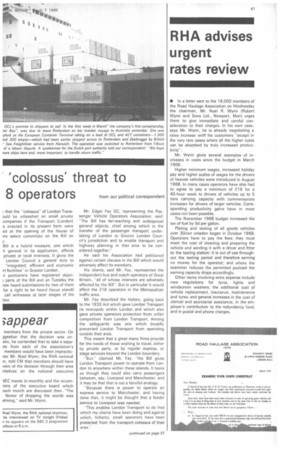'colossus' threat to
Page 43

If you've noticed an error in this article please click here to report it so we can fix it.
8 operators from our political correspondent
; that the "colossus" of London Transmild be unleashed on small private companies if the Transport (London) s enacted in its present form were ad at the opening of the House of ins select committee on the Bill on Bill is a hybrid measure, one which h general in its application, affects private or local interests. It gives the London Council a general duty to "integrated, efficient and economic rt facilities" in Greater London, n petitioners have registered objec) parts of the Bill and on Tuesday the [tee heard submissions by two of them for a right to be heard (locus standi) call witnesses at later stages of the tee.
Mr. Edgar Fay QC, representing the Passenger Vehicle Operators Association, said: "The Bill has far-reaching and widespread general objects. chief among which is the transfer of the passenger transport undertaking of London to Greater London Council's jurisdiction and to enable transport and highway planning in that area to be considered together."
He said his Association had petitioned against certain clauses in the Bill which would adversely affect its members.
His clients, said Mr. Fay, represented the independent bus and coach operators of Great Britain, "all of whose interests are adversely affected by the Bill", But in particular it would affect the 218 operators in the Metropolitan traffic area.
Mr. Fay described the history, going back to the 1933 Act which gave London Transport its monopoly within London and which also gave private operators protection from unfair competition from London Transport. Among the safeguards was one which broadly prevented London Transport from operating outside their area.
This meant that a great many firms provide for the needs of those wishing to travel, either by private party, or by regular express, or stage services beyond the London boundary.
"But," claimed Mr. Fay, "the Bill gives London Transport power to operate from London to anywhere within these islands. It looks as though they could also carry passengers between, say, Liverpool and Manchester, and it may be that that is not a fanciful analogy.
"Because there is power to operate an express service to Manchester, and having done that, it might be thought that a feeder service to Liverpool was needed.
-This enables London Transport to do that which my clients have been doing and against which, hitherto, small operators have been protected from the transport colossus of their area,"












































































































































































